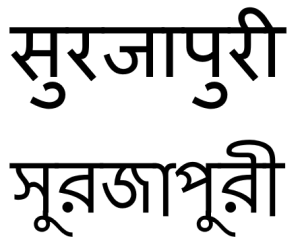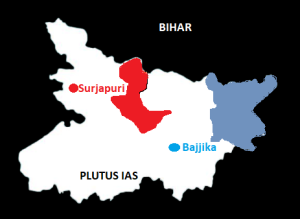01 Oct Bihar language: Surjapuri and Bajjika
Bihar language: Surjapuri and Bajjika
The topic is based on how the language of Bihar like Surjapuri and Bajjika impacts Indian Polity and Governance-Constitution.
The dialect Surjapuri is a mix of three languages Bangla, Urdu, and Hindi, and spoken primarily in Kishanganj and some other parts of Seemanchal in Northeastern Bihar, including the district of Bihar Katihar, Purnia, and Araria and also in contiguous parts of West Bengal.
The common speakers of this language are Muslims Surjapuri Muslims, who primarily live in Krishanganj, 70% of the population of the district is Muslim. In spite of the fact that the dialect has nothing specific to do with religion.

Pic: Surjapuri
On the other hand, the Bajjika is not as popular as other dialects like Bhojpuri and Maithili. Bajjika is a mix of Hindi and Maithili and is one of the five dialects spoken in Bihar. and basically, this language is spoken in Vaishali, Muzaffarpur and part of Sitamarhi, Sheohar and Samastipur.

Pic: Bihar language-Surjapuri and Bajjika
About the 8th Schedule
- The 8th schedule of India lists down the all official language of the Indian Republic.
- Part XVII of the Indian Constitution deals with the official languages in Articles 343 to 351.
- It lists the official languages of the Republic of India. Part XVII of the Indian constitution deals with the official languages in Articles 343 to 351.
- The official languages of the Indian Constitution:
- The 8th schedule of the Indian Constitution has 22 languages of India
| Assamese, | Manipuri, | Telugu, |
| Bengali, | Marathi, | Urdu, |
| Gujarati, | Nepali, | Bodo, |
| Hindi, | Oriya, | Santhali, |
| Kannada, | Punjabi, | Maithili |
| Kashmiri, | Sanskrit, | and Dogri |
| Konkani, | Sindhi, | |
| Malayalam | Tamil, |
14 languages were included in the constitution initially.
Rest were added later
- Sindhi was added by the 21st Amendment Act of 1967 and primarily spoke in Rajasthan.
- Konkani(in goa and some parts of Maharastra), Manipuri(Manipur), and Nepali(Sikkim and the Gorkhaland Territorial Region of West Bengal) were included by the 71st Amendment Act of 1992.
- Bodo(Assam and Meghalaya), Dogri(union territory of Jammu and Kashmir.), Maithili(one of the three main languages of BIHAR), and Santhali (West Bengal, Jharkhand, and Orissa.)were added by the 92nd Amendment Act of 2003 which came into force in 2004.
The idea behind it
- There exist 8 academics or functioning organizations for languages — Hindi, Urdu, Bhojpuri, Maithili, Angika, Magahi, Bangla, and South Indian languages in Bihar, and the government’s decision on these two dialects takes note of it what had been left out.
- The aim of setting up an umbrella Organisation for Bihar’s language and anticipating a platform for academics, litterateurs, and officials to work together to promote literary writing, the improvement of dictionaries, and the also updating of the grammar of these dialects.
- The primary idea is to promote literature and run more research on Surjapuri and Bajjika dialects to promote these two dialects
Sources:
Current Affairs for UPSC
Looking for Everyday Current affairs for UPSC assessment for expanding your overall performance. For competitive examinations like UPSC, IAS, SSC, and others, Plutus IAS provides daily current affairs for the UPSC examination. Any IAS aspirant can get benefit from reading Current Affairs for IAS exam to learn about national and international news in this day.
The reasons for choosing Plutus IAS for Current affairs
Daily top 10 current affairs are listed on Plutus IAS servers. Our website offers free access to all IAS Current Affairs. There are numerous websites that offer daily current affairs for the UPSC exam. However, we offer the most accurate and superior current affairs for free for the UPSC, IAS, and SSC exams. From today obtain the daily current affairs for the UPSC from us.
For getting more information on Daily Current Affairs, please follow our online classes:
Download the PDF Now:



No Comments